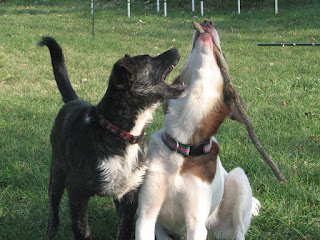Or is Life Play? That sounds sweet eh? But the reality is play is not easy or intuitive for every one.
The very definition of play includes the pursuit and attainment of fun but there are plenty of instances when play is only fun for one participant.
Elements of play include:
- anticipation
- surprise
- pleasure
- understanding
- strength
- poise
Each element relates to the others and can move "the game" forward as this neat little graphic from The Strong illustrates so well.
Play has many emotional, social and physical benefits. Canines and humans alike feel better after a game, we are better able to interact with others through play and our bodies appreciate the physicality of play. Mental challenges enrich us both as well - and can tire us out. Mutual play can be wonderful. It can also be hard work - as we learn each others rules, preferences and develop the ability to balance together in an harmonious dance of joy. An oft held belief is that humans are the "only" species that plays as adults. The dogs, horses, cats and parrots here all beg to differ. The amount of play and the purpose of play evolves as we (all!) age and change no doubt but play is a valid and important use of time through life.
Play can be personal and individual ,,, as Sampson so ably demonstrates when he grabs a stick on the lawn or this crow does
Play can be group
and it can cross species too.
Play is a demonstrably important aspect of learning for many species. Predators learn to hunt through play, horses learn social manners through play, and children develop all kinds of skills through games, Birds learn skills including their song through imitation and play. Creativity, ingenuity and critical thinking are all enhanced by play.
Sadly, life tends to choke some of the fun out of play as we grow. Play isn't equally easy for all children nor all adults. (Nor for that matter all horses or dogs - the two non human species whose play I have observed and worked with). But, and this is a critical concept .... play is a skill. Yes there is an element of art to it - intuition and guessing can work well in play - but there are actual definable skills that can be applied to principles of play. Play can be learned. Play can be taught.
Learning appropriate play is as important for young humans as young dogs. Revisiting basic play principles and learning to work together is one of the fundamental key concepts embedded through the classes at Fenzi Dog Sport Academy, Courses with names like Obedience Games, Heeling Games, Relationship through Play, Focus Games, Training with Remote Reinforcement, and so on fill the list of course offerings. Many, if not all, of the amazing instructors use play as a tool to help build relationship and mutual appreciation of the work of a given dog human team.
This term alone (classes start June 1) there is a Toy Class, Cookie Jar Games and my newest general offering Don't Worry: Be Happy which looks very hard at the human side of play. It builds human play skills (which will enhance dog play skills too - have no doubt of that) by breaking down what play is for humans, why it matters and further considers strategies to enhance play skills for people. Toy, personal and food play will all be assessed particularly in light of individual team differences. When, why and how to use play and when to call it quits with grace are also topics. I'm looking forward to taking my personal love of play and my drama teacher training and applying it to play in an online class.
I have blogged about play a great deal over the years ... the word "play" in search pulls up over 6 pages of posts ... the posts range widely but cover all kinds of divergent and dog focused thoughts.



No comments:
Post a Comment